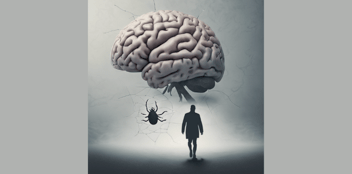Is Your Anxiety and Depression Caused by a Hidden Allergic Reaction?
- Home
- Blog

Understanding the Neuropsychiatric Effects of MCAS
When you think about allergies, you might envision sneezing, itching, or hives—the typical reactions associated with environmental triggers like pollen or pet dander. But what if I told you that certain emotional reactions, including anxiety and depression, might also be tied to a kind of "allergic" response within your body? This might sound far-fetched, but through the lens of Mast Cell Activation Syndrome (MCAS), it becomes a viable question to explore.
What is MCAS?
Mast Cell Activation Syndrome (MCAS) is a complex condition where mast cells, a type of white blood cell part of your immune system, behave erratically and release a disproportionate number of mediators—substances that can affect tissues and organs. Normally, mast cells help protect you from disease and aid in wound healing by releasing substances such as histamine, cytokines, and other enzymes. However, in MCAS, these cells are triggered to release anywhere from 200 to 2000 different molecules, often at inappropriate times and in excessive amounts. This can result in chronic inflammation in the body and the brain.
How Does This Relate to Mental Health?
The connection between MCAS and mental health issues like anxiety and depression hinges on the type of mediators released and where they are released. Since mast cells can migrate throughout the body and infiltrate various tissues, the symptoms of MCAS can be wide-ranging and difficult to predict. For those with MCAS, mediators that influence the brain and nervous system can trigger symptoms that are psychological in nature.
Common Mediators and Their Effects:
- Histamine - Typically involved in allergic reactions, histamine can also affect the brain, potentially causing anxiety and mood disturbances.
- Cytokines - These proteins can induce inflammation and have been linked in numerous studies to the development of depression and other psychiatric conditions.
- Tryptase - Another mediator that can influence immune responses and contribute to systemic symptoms, including neuropsychiatric ones.
Physical and Psychological Symptoms:
While the physical symptoms of MCAS can include feeling like one might faint, brain fog, rashes, swelling, abdominal pain, and fatigue, the psychological impacts are equally significant. Depression and anxiety can manifest not just due to the physical discomfort and unpredictability of MCAS but also as a direct result of mediator-induced changes in the brain chemistry.
Diagnosing MCAS: The Role of Genetic Testing
Diagnosing this condition can be challenging, as laboratory tests are often normal. For example, tests like serum Tryptase, Prostaglandin D2, Chromogranin A, and plasma heparin may give so-called “false negative results” as the mast cells do not remain in the bloodstream for long. Instead, they migrate into tissues and organs where they can remain and cause problems when activated. An important, cutting-edge genetic test that can assist in diagnosing and treating MCAS is IntellxxDNA. They have developed a “Mast Cell and IgE” panel that identifies genes that predispose to a higher risk of developing this condition. Once the genes are identified, their expression can be modulated (“turn them on or turn them off”) using supplements, medications, and dietary changes.
Treatment Approaches:
Addressing MCAS effectively may also involve the use of medications that can block the effects of histamine (H1 and H2 receptor antagonists) and stabilize the mast cells to prevent them from releasing mediators indiscriminately. For many, this approach can lead to a significant reduction in both the physical and psychological symptoms of the condition.
Rethinking Mental Health:
The interplay between immune system abnormalities and mental health is a burgeoning field of research, shedding light on how conditions like MCAS can underpin what might initially seem like straightforward psychiatric disorders. This insight invites us to reconsider and broaden our approach to treating mental health issues, looking beyond the brain to the body as a whole, calling for a holistic psychiatry approach. This is what our Root Cause Psychiatry™ Program is all about.
Final Thoughts:
If you're struggling with symptoms of anxiety or depression along with a number of unexplained physical symptoms, and haven't found relief through traditional treatments, consider the possibility of an underlying condition like MCAS. Understanding the root cause of your symptoms is the first step toward finding an effective treatment and regaining control of your health and well-being.
Ready to Explore More?
Curious about how your mental health symptoms could be linked to physical health conditions like MCAS? Let's discuss a holistic approach to your health that considers both your physical and mental well-being.
.png?width=144&height=144&name=Untitled%20design%20(34).png)



